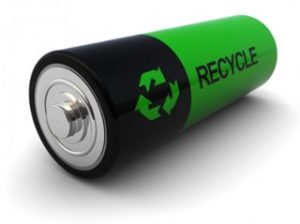 Batteries, like many other types of electronic waste, contain harmful chemicals that can wreak havoc on the environment as well as being hazardous to people. A variety of materials are used to make batteries, some more dangerous than others.
Batteries, like many other types of electronic waste, contain harmful chemicals that can wreak havoc on the environment as well as being hazardous to people. A variety of materials are used to make batteries, some more dangerous than others.
Lithium-ion (Li-ion) is the fastest growing type of battery, and is often found in notebook computers and mobile phones. Nickel-cadmium (Ni-cad) batteries have been used heavily in photography equipment and portable electronics. Lead-acid batteries are typically reserved for car batteries because of their large power-to-weight ratio and low cost.
Alkaline batteries are the single-use AA, AAA, and C batteries often utilized in household electronics. Alkaline batteries account for 80% of manufactured batteries in the US and over 10 billion individual units produced worldwide. An important difference between these single-use alkaline batteries and the majority of other types of e-waste is that these batteries are not rechargeable and are rarely recycled, so they often end up in a landfill.
Unlike single-use batteries, rechargeable batteries typically have a very high rate of recycling. Most rechargeable batteries are recycled along with the device that contained them at the end of their usable life.
Why are single-use batteries so seldom recycled? The likely answer is that modern alkaline batteries simply don’t seem as toxic to the general public in comparison to other electronics. Since they are meant to be “disposable,” that’s how people treat them. Unfortunately, heavy metals such as cadmium, lead, lithium, nickel, silver, and zinc exist in batteries as well as manganese dioxide and potassium hydroxide. These can present environmental problems by leaching into surface or groundwater and entering into the air and soil if landfilled.
More importantly, alkaline batteries do not contain valuable materials, and therefore have a net cost of disposal. Compounding this is the fact that the chemistry and construction used in alkaline batteries makes them one of the hardest and most inefficient battery types to recycle.
Legislation is only now beginning to catch up to the problematic lack of single-use battery recycling. The state of California considers all batteries as hazardous waste when discarded, and has banned the disposal of batteries with other domestic waste. Most states do not have specific battery disposal laws. In Europe, battery disposal is controlled by the WEEE Directive and Battery Directive regulations, and as such alkaline batteries must not be thrown in with domestic waste. In the EU, most stores that sell batteries are required by law to accept old batteries for recycling
The current US recycling system for for lead-acid batteries includes a fee charged to consumers who buy new automobile batteries without returning a used battery to be recycled at the time of purchase. Though this technique works in this particular system, it is not likely to be transferrable to small, inexpensive, single-use consumer batteries because consumers will not likely be pleased with the added cost and don’t have an easy way to return them for recycling. These factors make it politically more difficult to pass regulations.
It is important that companies encourage the use of rechargeable batteries wherever possible, and also that you create collection bins for alkaline (disposable) batteries. Even though you may incur a nominal cost by sending these to your electronics recycler, employees should not be allowed to throw single-use batteries away at their desks. Though these batteries are being consumed slightly less due to the increase in pervasiveness of mobile devices that use rechargeable batteries, many items like calculators, clocks, radios and computer mice still use them.
At Lifespan, we do our best to recycle each and every battery that comes through our facilities. Batteries are removed from all devices, and sorted and stored according their type. Safety measures are in place to prevent battery leakage or explosions. Each battery type is recycled by an audited, certified processor.


